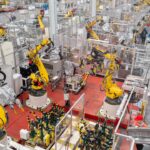A South Korean research team recently claimed to have created room-temperature superconductor, and the news quickly spread beyond the scientific community, sparking heated discussions at the societal level in multiple countries. It also triggered a chain reaction in the international capital market, causing stocks related to superconductor technology to soar. The physics community hasn’t been this lively in a long time, and it seems that the world rarely finds such an exciting new focal point amid the noise of geopolitical conflicts and confrontations.
Superconductivity is considered one of the greatest discoveries of the 20th century. However, the current limitation of superconducting materials to low temperatures severely restricts the practical application of superconducting technology, which is only limited to a few specific scenarios such as magnetic levitation. Therefore, achieving room-temperature superconductor is also referred to as the “expectation of the industry, the dream of physics.” Scientists from around the world have been striving for this breakthrough because, once achieved, it will bring revolutionary changes to various fields such as energy, transportation, computing, and medical testing, even starting a “fourth industrial revolution.”
However, the researchers say that LK-99, a compound of lead, copper, phosphorus and oxygen, is a superconductor at temperatures above 400 kelvins (260 degrees F) and ambient pressure, which is truly incredible. The team leader stated recently that the paper had flaws and was published without authorization by a member, and they have requested its removal. These less rigorous actions have led more people to believe that it was an academic mistake. However, some people say that some scientific discoveries are just as miraculous, such as graphene, which was obtained by two scientists repeatedly sticking and “tearing” graphite with tape and for which they received the Nobel Prize.
On the one hand, people are skeptical about whether the South Korean team has truly achieved room-temperature superconductor, but on the other hand, they hope it is true. The anticipation for a revolutionary breakthrough in human technology is buried in the hearts of nearly everyone, waiting to be ignited. It transcends national borders and ethnicities. Regardless of which country’s scientists achieve success in room-temperature superconducting materials research, they will undoubtedly become a legend for all of humanity and a well-deserved hero.
The task of confirming or refuting this discovery can only be completed by scientists, but this incident serves as a reminder for everyone. It reminds us of what is truly meaningful and worth pursuing, which is promoting overall human progress, primarily through the power of technology.
Any major breakthrough in technology has global significance. Just like this time, no one would refuse to see a major scientific breakthrough achieved by South Korea based on which alliance or camp it belongs to. At this moment, everyone will realize that we are all human beings, and perhaps we have complex differences and contradictions, when facing the most significant problems, our interests are aligned and our destinies linked.
Imagine boldly, if room-temperature superconductor materials really achieve a breakthrough and are put into application on a large scale, then many things that are fought between countries and people today, especially geopolitical and ideological, will be unnecessary. Now the US and Western countries are a bit stuck in this; they need to look at themselves, the world and the situation of humans from a higher dimension and broader perspective, and jump out of geopolitical and ideological paranoia.
First, humanity is facing many challenges, whether it is climate issues, public security issues or development issues, which require international cooperation, opening-up and sharing more than ever before. Second, a better future calls for humanity. This also requires humanity to work together and focus on common economic development and common scientific and technological progress. Geopolitical disputes are by no means the destiny of humanity; they can be overcome, and continuous breakthroughs in technology are a “fatal blow” to it.
Despite the huge controversy, one thing is certain, that is, the world’s collective desire for new technologies, especially major technological changes that affect people’s livelihood. This is why even though room-temperature superconductor seems more like hype that comes out of thin air at the moment, it still inspires people in different countries and regions.
In this sense, this wave of “room-temperature superconductor” mania has aroused people’s thinking, which is related to science but also beyond science.
(Global Times)




